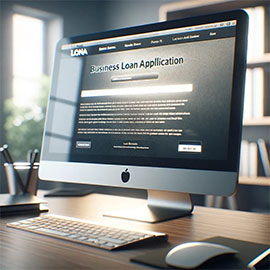How do business loans work?
Here’s how to get the funding you need for your business
+1 more

If you’re a small business owner, you often wear multiple hats, managing everything from day-to-day operations to long-term strategic planning. But no matter how efficiently you manage your business, there may come a time when you need additional funds.
A business loan can provide the necessary capital to achieve your goals. Whether it's for expanding your business, purchasing new equipment or simply managing day-to-day expenses, here’s a closer look at how business loans work.
Key insights
- There are many types of business loans to suit various funding needs like equipment, real estate, working capital and more.
- Eligibility for a business loan typically depends on factors like credit score, business revenue and time in business.
- While loans provide capital, they are still debt that needs to be paid back. Having a solid repayment plan is key to setting yourself up for long-term success.
What is a business loan?
A business loan is a specific amount of money lent to a business by a lender. Unlike a personal loan, which is given to an individual for personal use, a business loan is specifically for business-related expenses. It’s also known as a commercial loan.
The time you have to pay back the loan can vary. Some business loans are short-term (a few months to a year), while others are long-term (up to 25 years or more). The amount borrowed can range widely, from a few thousand dollars to millions, depending on your business's needs and the lender's policies.
Usually, you pay back a business loan in regular installments, which could be daily, weekly or monthly. The payments typically include the principal amount (the original sum borrowed) and interest (the cost of borrowing the money).
What business loans can be used for
Businesses can use loans for a variety of purposes:
- Covering startup costs for a new business
- Expanding a business by opening a new location or hiring employees
- Purchasing equipment or machinery
- Buying commercial real estate
- Stocking up on inventory or raw materials for your business
- Getting working capital to cover operational expenses
- Refinancing debt to improve your business’s cash flow
You generally can’t use a business loan for personal expenses or illegal activities.
Types of business loans
Below are six of the most common types of business loans. Some lenders may specialize in one or two types of loans, while others may offer nearly every type imaginable.
Term loans
A term loan is a classic type of business loan in which you borrow a set amount of money upfront and pay it back with interest over a set period. These loans often have fixed interest rates and a set repayment schedule, usually weekly or monthly.
Term loans can have long or short repayment periods. Loans with shorter repayment periods (often three to 18 months) are also referred to as working capital loans.
SBA loans
SBA (Small Business Administration) loans are backed by the U.S. government. This makes them attractive to lenders as there is less risk. There are a few main types of SBA loans.
- 7(a) loan: General purpose loans up to $5 million for working capital, equipment, real estate, etc. SBA guarantees up to 85% of the loan amount.
- 504 loan: For fixed assets like equipment and commercial real estate. Requires 10% borrower contribution and up to 40% SBA-backed loan.
- Microloan: Up to $50,000 for working capital or supplies. SBA makes the loan directly to small and startup businesses.
Lines of credit
A line of credit is a revolving loan that allows you to borrow money as needed up to a preset maximum amount. Only the amount you borrow incurs interest charges.
Lines of credit can be used for seasonal business needs, inventory purchases or unexpected expenses. They tend to have higher interest rates than term loans but offer more flexibility.
Invoice factoring
Invoice factoring is where you sell outstanding invoices to a lender in exchange for immediate access to cash, rather than waiting 30 to 90 days for payments to come through.
The biggest benefit of factoring is that it doesn’t rely on having a strong credit score, as it’s based on outstanding invoices. It’s best for businesses that have long invoicing periods but need fast access to cash.
Merchant cash advances
A merchant cash advance provides an upfront lump sum in exchange for a fixed daily percentage of future credit and debit card sales. You pay this percentage until the advance is paid off. These advances are an alternative to a traditional loan.
While approval is quick, the cost of advancing future receivables makes it one of the more expensive financing options. It may be a good option for startups or businesses needing funds quickly.
Equipment financing
Equipment loans are term loans specifically for financing equipment purchases like machinery, computers and vehicles. They tend to have terms of up to 25 years and require a down payment, often 20% of the equipment price.
How to get a business loan
You’ll often follow these steps to get a business loan:
- Check your credit score. Lenders often look at your personal and business credit scores. A higher score can improve your chances of getting approved and may lead to better loan terms.
- Gather your financial documents. This includes business financial statements, tax returns, a business plan and legal documents (like incorporation papers).
- Choose the right lender. Compare banks, credit unions and online lenders to find the best fit for your business. You can even use a business loan marketplace like Fundera or Lendio to compare offers from multiple lenders at once.
- Fill out the application. You can typically apply online. Make sure your answers are accurate to avoid hiccups and delays.
- Wait for approval. The lender will review your application, run a credit check and possibly request additional information. This stage can take anywhere from a few hours to several weeks, depending on the type of loan you’re applying for.
Most lenders have set eligibility requirements, including a minimum credit score, a minimum time in business and a minimum monthly or annual revenue. For instance, Biz2Credit requires a minimum 660 credit score, 18 months in business and $250,000 in annual revenue to be eligible for a loan.
» COMPARE: Best business loan companies
Where to apply for a business loan
Just like personal loans, business loans are available from banks and credit unions, as well as alternative and online lenders. Deciding where to apply depends on the eligibility criteria, convenience and what types of loans they can offer you.
Traditional lenders
You should first contact your current bank or credit union to see whether you qualify for a small business loan. “If you do qualify, you are likely to receive superior pricing to most other forms of financing,” said Ben Johnston, chief operating officer of Kapitus, a direct lender headquartered in New York.
However, traditional lenders can be more conservative with lending capital, especially to new business owners. “In many cases, a business plan, financial statements, personal guarantees and specific collateral will be required, and for younger businesses without a strong history of profitability, acceptance rates can be low,” Johnston said.
Alternative lenders
Alternative lenders can make small business loan offers in a matter of minutes, and many fund offers in as little as 24 hours. While alternative lenders often charge more for loans than banks and credit unions, Johnston said they generally don’t require collateral and can accept a wider range of applicants.
“Alternative lenders may require as little as an application, three months of bank statements, approval to pull credit and a driver's license to underwrite and approve a customer,” he explained.
Marketplaces
While online marketplaces can’t directly lend you a business loan, they’re a good option to start your research. With a marketplace, you typically input information about the type of loan you’re seeking and your business’s qualifications (credit score, time in business, etc.) and then are matched with suitable loan options.
FAQ
How many business loans can you have?
“There is not a strict limit on how many business loans a business can have,” said Katie Kramer, executive director of the Ohio Statewide Development Corp. (OSDC). “Every bank will have a different tolerance for how much credit it is willing to accept from other institutions.”
If your business’s debt-to-income ratio is too high, it can be harder to get approved for more loans.
What credit score do you need for a business loan?
The required credit score for a business loan varies by lender, but generally, a score of 600 is the bare minimum. Higher scores (like 700 or above) will increase your likelihood of approval and help you secure better loan terms.
What happens if you default on a business loan?
If you default on a business loan, the lender may take legal action to recover the debt. This could result in losing collateral if it’s a secured loan or personal assets if it’s an unsecured loan with a personal guarantee. It will also damage your credit score and make it harder to get approved for other loans in the future.
Can you use a personal loan as a business loan?
Many lenders won’t let you use a personal loan for business use, but some will. You need to check the usage requirements for specific lenders. Also, keep in mind that you won’t build business credit if you use a personal loan as a business loan.
“One of the most significant challenges entrepreneurs face when starting a business is obtaining the capital required to fund growth,” Johnston said. “Most businesses are launched using a combination of personal savings, personal credit and investments from friends and family.”
Bottom line
Business loans are important for helping businesses with their financial needs, whether that's for starting up, expanding or just managing day-to-day expenses. There are different types of loans to fit different business needs. Understanding your options can help you access the capital necessary to take your business to the next level.
Article sources
ConsumerAffairs writers primarily rely on government data, industry experts and original research from other reputable publications to inform their work. Specific sources for this article include:
- U.S. Small Business Administration, “Terms, conditions, and eligibility.” Accessed Dec. 4, 2023.
- Federal Deposit Insurance Corporation, “Need a New Loan for Your Small Business?” Accessed Dec. 4, 2023.
- U.S. Small Business Administration, “Microloans.” Accessed Dec. 4, 2023.
- U.S. Small Business Administration, “504 Loan Program.” Accessed Dec. 4, 2023.






